

Nov 2018 - Extinction Rebellion Protest in London Against Climate Change. Demonstrators block roads to demand action on climate change (ITV News, 24/11/2018) Environmental activists blocked roads and swarmed landmarks in London calling on the "ecocidal Government" to take rapid action to avoid potentially catastrophic climate change.
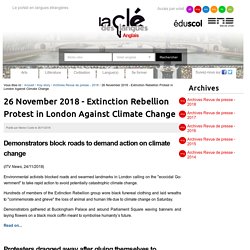
Hundreds of members of the Extinction Rebellion group wore black funereal clothing and laid wreaths to "commemorate and grieve" the loss of animal and human life due to climate change on Saturday. Demonstrators gathered at Buckingham Palace and around Parliament Square waving banners and laying flowers on a black mock coffin meant to symbolise humanity’s future.
Read on... Protesters dragged away after gluing themselves to Buckingham Palace gates Lucy Middleton (Metro, 24/11/2018) Police have arrested 14 activists in central London after Extinction Rebellion campaigners glued themselves to the gates of Buckingham Palace. Students Across the World Are Protesting on Friday. Why? What began as one student’s vigil calling for action on climate change has gone global, with school strikes planned in more than 100 countries on Friday.

Here is a look at how the climate protests spread and how political leaders are responding. [See pictures from the youth strikes around the world.] It’s Not Climate Change — It’s Everything Change — Matter. Not that the lobster can do anything about it, once in the pot.
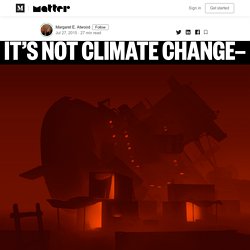
But we might. We’re supposed to be smarter than lobsters. We’ve committed some very stupid acts over the course of our history, but our stupidity isn’t inevitable. Here are three smart things we’ve managed to do: First, despite all those fallout shelters built in suburban backyards during the Cold War, we haven’t yet blown ourselves up with nuclear bombs. Inventing Climate-Change Literature. May 2019 - The rich getting richer under climate change, study reveals. How global warming has made the rich richer Pablo Uchoa (BBC World Service, 06/05/2019) Temperatures may be rising globally, but not all of us feel the impact in the same way.
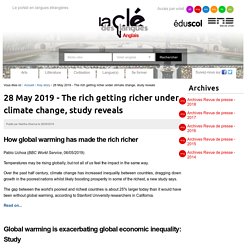
Language matters when the Earth is in the midst of a climate crisis. In a 2015 essay, poet and novelist Margaret Atwood wrote, “It’s not climate change, it’s everything change.”
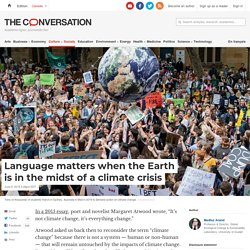
Atwood asked us back then to reconsider the term “climate change” because there is not a system — human or non-human — that will remain untouched by the impacts of climate change. Everything will be affected, and so, likely, everything (as we know it) will have to change. The writing impressed me, and I agreed with her thesis, but somehow it wasn’t this essay that shook me up as much as another recent reading on climate change did. The recent scientific Special Report on the impacts of 1.5C of global warming of the Intergovernmental Panel on Climate Change (IPCC) concluded: “Limiting global warming to 1.5C would require rapid, far-reaching and unprecedented changes in all aspects of society.”
How people worldwide view climate change. April 22 is Earth Day, an annual event that highlights environmental concerns and encourages civic action.
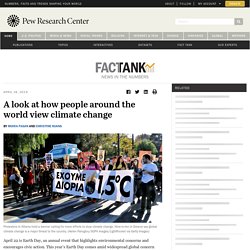
A look at how Americans see climate change. The degree to which climate change threatens the ecosystems of the Earth and societies around the world has been an ongoing subject of debate – and sometimes protest.
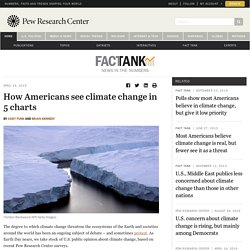
Climate.nasa. NASA isn't all about interplanetary exploration; in fact, the agency spends much of its time studying our home planet.
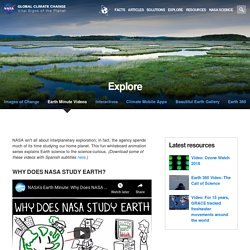
This fun whiteboard animation series explains Earth science to the science-curious. (Download some of these videos with Spanish subtitles here.) Earth is a complex, dynamic system we do not fully understand. To learn more about it, NASA, as the agency with access to space, was tasked with launching the first weather satellite back in 1960. Today, NASA uses satellites, aircraft and even an occasional boat to study our planet's air, land and water. Download video file. Aerosols are minute solid and liquid particles suspended in the atmosphere. Download video file. Clouds are complicated when it comes to climate science, as they both warm and cool Earth.
Download video file. Located in the Arctic near the North Pole, the island of Greenland is covered by a massive ice sheet three times the size of Texas and a mile deep on average. What is global warming, facts and information? Glaciers are melting, sea levels are rising, cloud forests are dying, and wildlife is scrambling to keep pace. It has become clear that humans have caused most of the past century's warming by releasing heat-trapping gases as we power our modern lives. Called greenhouse gases, their levels are higher now than at any time in the last 800,000 years.
We often call the result global warming, but it is causing a set of changes to the Earth's climate, or long-term weather patterns, that varies from place to place. While many people think of global warming and climate change as synonyms, scientists use “climate change” when describing the complex shifts now affecting our planet’s weather and climate systems—in part because some areas actually get cooler in the short term.
Climate change encompasses not only rising average temperatures but also extreme weather events, shifting wildlife populations and habitats, rising seas, and a range of other impacts. Understanding the greenhouse effect. Curious Kids: how is global warming heating up the Earth? Curious Kids is a series by The Conversation, which gives children of all ages the chance to have their questions about the world answered by experts.
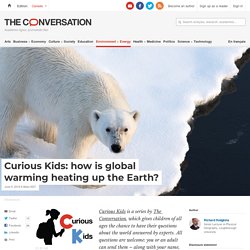
All questions are welcome: you or an adult can send them – along with your name, age and town or city where you live – to curiouskids@theconversation.com. We won’t be able to answer every question, but we’ll do our best. Is global warming heating up the Earth? - Raphael, aged 11, Auckland, New Zealand. The simple answer to this important question is “yes”. We know that both the planet’s air and its oceans have been getting warmer over the last 100 years or more. Almost all parts of the world have reliable weather records going back many years.